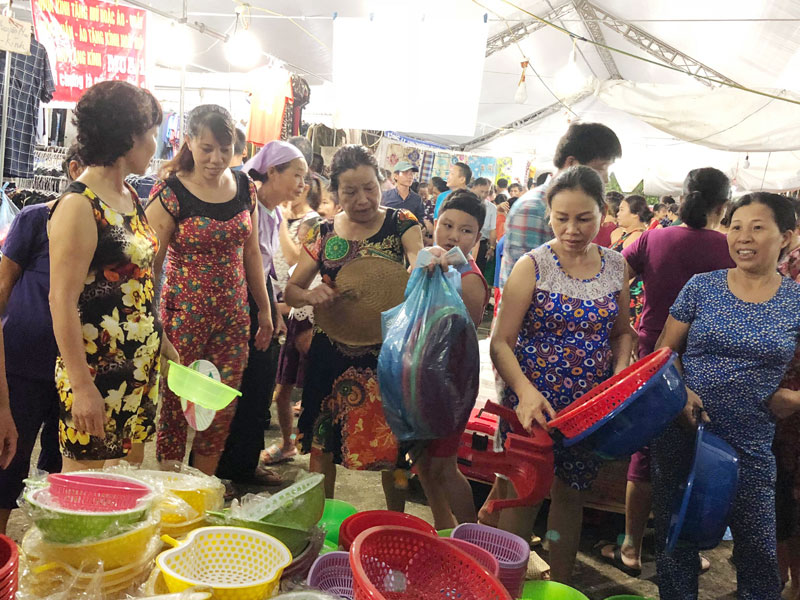
(HBO) – Hoa Binh has launched a number of small trade fairs that sells made-in-Vietnam goods in local remote areas, leaving good impression in every area where the fair was held. Many people have flocked to such fairs in excitement to purchase a variety of high-quality products in diverse designs.

A trade fair brings
made-in-Vietnam goods to the remote Tu Ne commune, Tan Lac district, attracting
a large number of visitors.
Bui Thi Ngat from Bai Trang village, Dong Lai commune, said the
fair offers a wide range of products that suit everybody’s need, including
cookware, ceramic bowls and plates, bedding, electronic appliances, clothing
and footwear. All the products are made in Vietnam so there is no need to be
worried about cheap and low-quality goods. They are sold at very reasonable
prices, for example, a rechargeable lamp is sold at 39,000 VND while its market
price is over 40,000 VND; plastic baskets and basins here are sold at 10,000
VND for all items.
The series of trade fairs began on August 10 with each lasting for
3 days. The province has organised five trade fairs since then with the last in
Dung Phong commune, Cao Phong district. The event in Phong Phu commune, Tan Lac
district was held when a storm came to the area, but it still saw a lot of
visitors. According to companies selling their goods at the trade fairs, this
year’s events generated revenue of 1.5 – 2 times higher than those of 2016 and
2017 as made-in-Vietnam products have won increasing trust and credibility from
local customers.
Chu Van Thang, deputy director of the provincial centre for
promotion of trade, investment and tourism, said the quality of each event has
been much improved after every year and as a result, it has been well-received
by local people. Companies participating in those events have been carefully
selected, and must be reputable producers in Vietnam./.
Dao Village’s honey – a product certified with a 3-star OCOP (One Commune One Product) rating by Thong Nhat Agricultural Cooperative in Dao Village (Hoa Binh City) – is highly regarded by consumers for its quality, richness, and variety in packaging. The distinctively sweet taste of Dao Village’s honey leaves a lasting impression on anyone who has tried it.
In alignment with Project No. 07-DA/TU, issued by the Hoa Binh provincial Party Committee on November 1, 2021, Lac Thuy district has actively promoted investment and supported the sustainable development of its industrial and handicraft sectors during the 2021–2025 period. Alongside this, the district has remained committed to preserving and revitalising traditional craft villages.
Located in the northern part of Lac Thuy district, with a temperate climate and fertile soil, Phu Thanh commune has great potential and advantages in growing tea. The long-standing experience, combined with strict adherence to organic farming practices in the tea gardens, ensures that the dried tea products from Phu Thanh and Lac Thuy as a whole are sold out immediately upon production, providing a stable and prosperous life for the local people.
Amid efforts to streamline the administrative apparatus, Hoa Binh province has intensified measures to address challenges in land clearance, resettlement support, and infrastructure investment, aiming to speed up the progress of key projects.
Hoa Binh province has posted an unprecedented economic growth rate of 12.76% in the first quarter of 2025, marking its highest quarterly performance to date and positioning it as the second fastest-growing locality in the country, trailing only Bac Giang province.
Under current regulations, products in the One Commune – One Product (OCOP) programme that are rated three stars or higher must undergo re-evaluation every three months. However, in reality, some of these products fail to consistently meet the required standards, raising concerns about the sustainability of their OCOP certification. This underscores the urgent need for producers to enhance product quality and gradually develop their OCOP products into strong, marketable brands.



